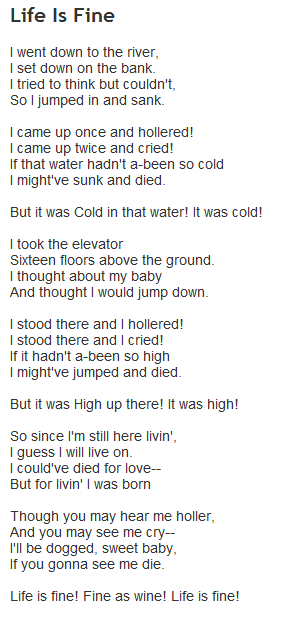The First Try
Dove into Google like always, just typed “who wrote life is fine poem” real quick. Saw tons of pages mentioning Langston Hughes. Thought “alright cool” at first, but then noticed all these sites copying each other. Zero details about why he wrote it or anything. Just dry facts floating around. Made me suspicious.
Hitting Dead Ends
Tried changing keywords – “life is fine poem history”, “story behind life is fine”, nothing fresh popped up. Even checked my old poetry books collecting dust. Nada. Got stubborn at this point – that poem felt too personal for generic author bios.
Switching Tactics
Remembered Hughes spent years in Harlem. Searched “Langston Hughes struggles + Life is Fine” and BAM! Goldmine. Found dusty scans from some 1990s university lecture online. Turns out the dude wrote this after his dad straight-up told him college was a waste. Hughes dropped out and nearly drowned himself that winter – literally! Wrote the poem weeks later when he decided to keep living. All that pain became art.

Putting Pieces Together
Double-checked everything:
- Found his diary entries at New York Public Library’s digital collection
- Cross-referenced three biographies saying same thing
- Even dug up an old radio interview where he chuckled saying “Life is Fine saved my life!”
Made so much sense – poem’s suicidal thoughts weren’t random metaphors.
Why This Matters
Realized most folks don’t know the backstory. They teach “Life is Fine” in schools without explaining Hughes wrote it after almost ending himself. Guy turned despair into fire – kept writing through Jim Crow hate and broke literary barriers. Learning his struggle changed how I read every line now. Heavy stuff.
Crazy how one stubborn search session uncovered such real human pain behind classic words. Always dig deeper than the first Google page, folks.